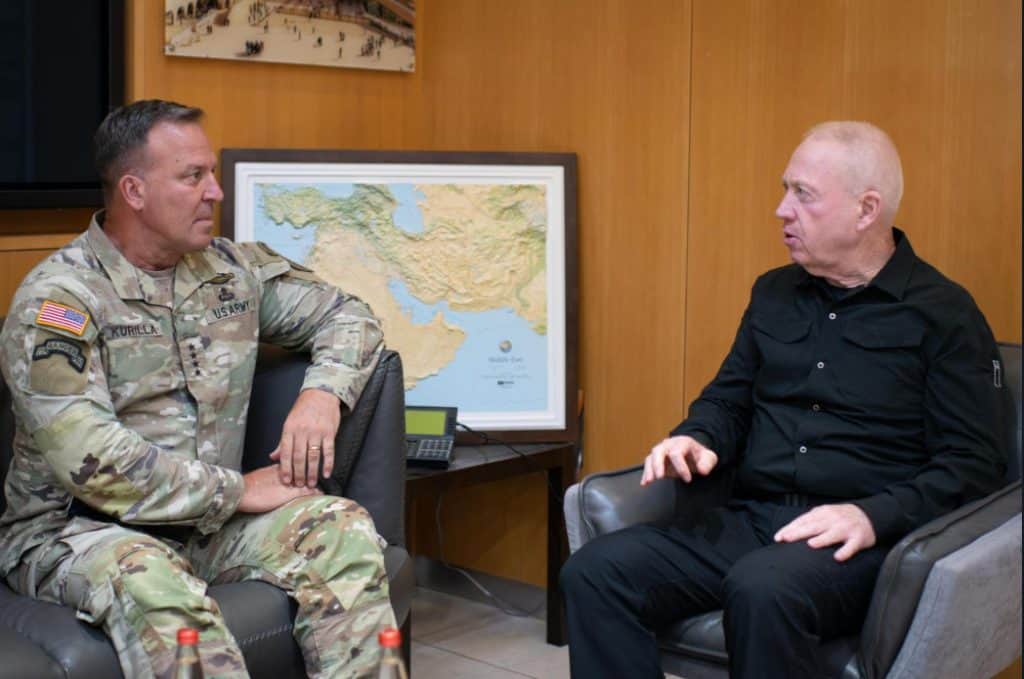
Israeli Defense Minister Yoav Gallant spoke to US Secretary of Defense Lloyd Austin on the evening of July 16, communicating his views on Israel’s progress in Gaza. Gallant “emphasized that IDF operations in Gaza have led to the conditions necessary to achieve an agreement for the return of hostages, which is the highest moral imperative at this time,” according to a statement from Gallant’s office.
The phone call with Austin is one of several important meetings Gallant held over the last week. He also met with US Central Command head General Michael Kurilla on July 16 and White House Coordinator for the Middle East and North Africa Brett McGurk, in two meetings on July 10 and July 11.
The discussion with Austin focused on several topics. Gallant discussed Israel’s attempts to “detect and engage senior Hamas leadership,” Gallant’s office noted, which means targeting them for elimination. The IDF recently carried out an airstrike targeting Hamas commander Muhammad Deif, who Gallant referred to as the “Osama bin Laden of Gaza,” and one of Deif’s brigade commanders. Recent reports in Israel portray Hamas as in “disarray” or “survival mode.”
Austin told Gallant that the Joint Logistics Over-the-Shore (JLOTS) pier the US had dispatched to Israel in March would cease operations. The pier was first attached to the Gaza shore in May but had to be removed several times due to bad weather and heavy seas.
“The Secretary stressed the importance of increasing the flow of humanitarian assistance through all land crossings and supporting aid deliveries to Ashdod Port in Israel for onward distribution in Gaza,” the US Department of Defense noted in a statement about the call. Gallant told Austin that Israel would build a temporary field hospital near the Gaza border to treat children in Gaza.
In talks with Kurilla, Gallant also provided situational assessments of operations in Gaza and clashes with Hezbollah in northern Israel. The Minister briefed General Kurilla on the recent strike targeting senior Hamas officials and emphasized Israel’s commitment to dismantling Hamas as a military and governing authority—including “pursuing its senior leadership,” Gallant’s office said. The two leaders also discussed the dismantling of the pier. Aid will now flow through the port of Ashdod, Gallant told Kurilla.
Gallant’s discussions with McGurk focused on the importance of recent Israeli talks with Egypt. Israel has controlled the southern Gaza border with Egypt since launching an operation along the border in May. In June and July operations, the IDF concentrated on finding tunnels Hamas used near Rafah and the border to smuggle and conceal weapons. Israel has focused on bulldozing areas on the Gaza side of the Philadelphi Corridor to widen this route and uncover terrorist infrastructure.
Gallant told McGurk that Israel wants to find a way to prevent weapons smuggling into Gaza in the future. He added that “the State of Israel supports the opening of the Rafah crossing; however, will not tolerate the return of Hamas to the area,” Gallant’s office noted.
Gallant’s meetings with Austin, Kurilla, and McGurk underpin the current focus of Israel’s war effort, including the return of 120 hostages held by Hamas, the elimination of the terrorist group’s leaders, and cutting Hamas off from being able to rebuild its capabilities. At the same time, Israel must attempt to prevent a worsening humanitarian crisis in Gaza. Gallant also focused on the Iranian threat and Hezbollah in these meetings, two key issues that will continue for Israel even if the Gaza war winds down







